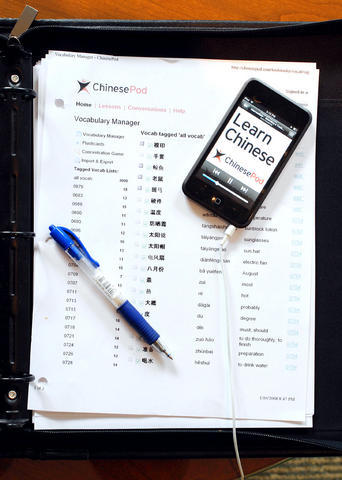The best way to learn a foreign language may be to surround yourself with native speakers. But if you can't manage a trip abroad, the Internet and a broadband computer connection may do the job, bringing native speakers within electronic reach for hours of practice.
Web-based services now on the market let people download a daily lesson in French or Hindi, pop on their headsets, and then use Internet telephone services and the power of social networks to try their conversational skills with tutors or language partners from around the world.
For those who want to polish their high-school German before a vacation, or to master snippets of well-intoned Mandarin Chinese to charm a future business host in Shanghai, these sites offer alternatives to more traditional tools like textbooks and CD-ROMs. LiveMocha (livemocha.com), for example, is a free site where members can tackle 160 hours of beginning or intermediate lessons in French, German, Mandarin Chinese, Spanish, Hindi or English. There is no charge for tutoring; instead, members tutor one another, drawing on their expertise in their own native language.

PHOTO: NY TIMES NEWS SERVICE
Members chat online by typing messages, by talking or, if they have a Webcam, by video, in exchanges with others who want to tutor or be tutored. English speakers learning Spanish, for example, can write or speak descriptions of a vacation and receive feedback on their grammar and choice of idioms from native Spanish speakers on the network. A Spanish speaker, in turn, may seek advice from the English speaker about English assignments.
LiveMocha introduced its Web site in late September last year, said Shirish Nadkarni, chief executive of the company, which is based in Bellevue, Washington. Since then, he said, about 200,000 users from more than 200 countries have joined.
"It's a community of like-minded learners who can leverage their native language proficiency to help one another," he said.

PHOTO: NY TIMES NEWS SERVICE
The name "LiveMocha" is meant to evoke the relaxed atmosphere of a coffee shop.
The site is still in beta, or testing, phase, Nadkarni said. Advertising will soon be added, as well as charges for some premium content and services.
Paul Aoki, director of the language learning center at the University of Washington, Seattle, signed up at LiveMocha primarily to see if his students might benefit. He says he thinks the site's social networking component makes it useful.
"It seems to be a pretty powerful opportunity for people around the world to connect with language partners," he said.
"Doing voice and text chat simultaneously is very useful," he said. "If you don't understand something your language partner is saying," he said, even when people at the other end speak slowly, "they can type it out and you can read it."
Curtis Bonk, a professor of education at Indiana University in Bloomington, is specializing in ways to integrate online technologies into teaching. He says LiveMocha is part of an explosion of educational resources for language learning on the Web.
"You no longer have to learn language as an individual in a silo somewhere, using a canned program on a CD-ROM," he said. "Instead, you have thousands of tutors to pick from -- if the first one doesn't work out, you can choose another."
Another electronic-based language learning program takes a different approach: podcasting.
Praxis Language, based in Shanghai, offers free lessons in Mandarin (ChinesePod.com) or Spanish (SpanishPod.com) as podcasts.
Many lessons include business-based vocabulary on topics like how to hire a courier in China, said Ken Carroll, a co-founder of Praxis. While the podcasts are free, transcripts, exercises and other services typically cost $9 to $30 a month, he said. For $200 a month, members can receive daily tutoring from professional, native-speaking teachers by way of Skype, the Internet-based telephone service.
Carroll says ChinesePod has more than 270,000 visitors a month, several thousand of them paying about $240 a year for a combination of premium services. Most of the paying customers live in the US, he said.
"They tend to be thirty-somethings, slightly mature, with some kind of business connection to China," he said.
Mike Kuiack, an investment banker in Vancouver, British Columbia, who often travels to China, was an off-and-on student of Chinese for eight and a half years before he signed on to ChinesePod. He has since been studying diligently for a year and a half, paying about $240 a year for premium services.
Since he started using the service, he said, his vocabulary has grown as much as it did in all of the previous years of study combined.
"Speaking and listening skills were what I needed," he said. "The podcasts have been very useful for this. Part of the reason I've made so much progress is that they are so enjoyable."
He works on lessons whenever he has a moment.
"I listen when I'm stuck in traffic," he said, "and also at my PC, where I can listen and read at the same time."
The studying is starting to pay off at work.
"I don't try to conduct negotiations in Chinese," he said, "but now at least I can listen to what's going on in meetings."

INVESTIGATION: The case is the latest instance of a DPP figure being implicated in an espionage network accused of allegedly leaking information to Chinese intelligence Democratic Progressive Party (DPP) member Ho Jen-chieh (何仁傑) was detained and held incommunicado yesterday on suspicion of spying for China during his tenure as assistant to then-minister of foreign affairs Joseph Wu (吳釗燮). The Taipei District Prosecutors’ Office said Ho was implicated during its investigation into alleged spying activities by former Presidential Office consultant Wu Shang-yu (吳尚雨). Prosecutors said there is reason to believe Ho breached the National Security Act (國家安全法) by leaking classified Ministry of Foreign Affairs information to Chinese intelligence. Following interrogation, prosecutors petitioned the Taipei District Court to detain Ho, citing concerns over potential collusion or tampering of evidence. The

TRADE: The premier pledged safeguards on ‘Made in Taiwan’ labeling, anti-dumping measures and stricter export controls to strengthen its position in trade talks Products labeled “made in Taiwan” must be genuinely made in Taiwan, Premier Cho Jung-tai (卓榮泰) said yesterday, vowing to enforce strict safeguards against “origin laundering” and initiate anti-dumping investigations to prevent China dumping its products in Taiwan. Cho made the remarks in a discussion session with representatives from industries in Kaohsiung. In response to the US government’s recent announcement of “reciprocal” tariffs on its trading partners, President William Lai (賴清德) and Cho last week began a series of consultations with industry leaders nationwide to gather feedback and address concerns. Taiwanese and US officials held a videoconference on Friday evening to discuss the

NEGOTIATIONS: The US response to the countermeasures and plans Taiwan presented has been positive, including boosting procurement and investment, the president said Taiwan is included in the first group for trade negotiations with the US, President William Lai (賴清德) said yesterday, as he seeks to shield Taiwanese exporters from a 32 percent tariff. In Washington, US Trade Representative Jamieson Greer said in an interview on Fox News on Thursday that he would speak to his Taiwanese and Israeli counterparts yesterday about tariffs after holding a long discussion with the Vietnamese earlier. US President Donald Trump on Wednesday postponed punishing levies on multiple trade partners, including Taiwan, for three months after trillions of US dollars were wiped off global markets. He has maintained a 10 percent

PERSONAL DATA: The implicated KMT members allegedly compiled their petitions by copying names from party lists without the consent of the people concerned Judicial authorities searched six locations yesterday and questioned six people, including one elderly Chinese Nationalist Party (KMT) member and five KMT Youth League associates, about alleged signature forgery and fraud relating to their recall efforts against two Democratic Progressive Party (DPP) legislators. After launching a probe into alleged signature forgery and related fraud in the KMT’s recall effort, prosecutors received a number of complaints, including about one petition that had 1,748 signatures of voters whose family members said they had already passed away, and also voters who said they did not approve the use of their name, Taipei Deputy Chief Prosecutor